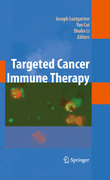
The principle of cancer immune therapy remains the stimulation of the immune system to control and destroy tumors, but the scope is expanded in steady and fast pace, the approach is modernized every few years, new molecules are revealed annually, and the understanding of the mechanisms is getting deeper and deeper. Targeted Cancer Immune Therapy covers cytokine immune therapy, cell-based immune therapy, and targeted immune therapy. In each of these three sections, only the novel aspects of immune therapy were selectively described instead of attempting to cover any historical achievement. In the first section, Cytokine Immune Therapy, the IL12 family, IL18, IL21, IL24, IL28, and IL29 were heavily discussed in regard to the anti-tumor function and application in treating tumors. In the second section, Cell-based Immune Therapy, the focus was given to engineering potent immune regulatory or effector cells such as dendritic cells, T cells, and stem cells. The cell engineering design is primarily basedon the increased understanding of the interaction of tumor antigen presentingcells, antigen specific effector cells, and the tumor microenvironment. In the third section, Targeted Immune Therapy, the focus was given on rearticulating the antibody therapy for boosting immune response, which includes immunocytokines, 'T-body', and tumor targeted CpG ODN. Immunocytokines represent a new class of biopharmaceuticals composed of two well known immune components – antibodies and cytokines – with the unique ability to target cytokines to the tumor microenvironment and thereby activate antitumor responses. Some or all of these innovative approaches may ultimately become the future effective immune therapy for treating malignancy. INDICE: Role of IL12 Family in Regulation of Antitumor Immune Response. IL-18 in Regulation of Antitumor Immune Response and Clinical Application. Interleukin-21 and Cancer Therapy. IL-24 in Regulation of Antitumor Immune Responseand in Signaling. IL-28 and IL-29 in Regulation of Antitumor Immune Response and Induction of Tumor Regression. Passive and Active Tumor Homing Cytokin Therapy. New Strategies to Improve Tumor Cell Vaccine Therapy. Modification of Dendritic Cells to Enhance Cancer Vaccine Potency. Dendritic Cell Vaccines for Immunotherapy of Cancer: Challenges in Clinical Trials. A Toll Bridge for T-Cells. Engineering Adult Stem Cells for Cancer Immunotherapy. Animal Models for Evaluating Immune Responses of Human Effector Cells in Vivo. CD40 Stimulation and Antitumor Effects. Immunocytokines: A Novel Approach to Cancer Immune Therapy. Immune Escape: Role of Ondoleamine 2,3-Dioxygenase in Tumor Tolerance. Adoptive Transfer of T-Bodies: Towards an Effective Cancer Immunotherapy. Targeting Toll Like Receptor for the Induction of Immune and Antitumor Responses. Manipulating TNF Receptors to Enhance Tumor Immunity for the Treatment of Cancer.
- ISBN: 978-1-4419-0169-9
- Editorial: Springer
- Encuadernacion: Cartoné
- Páginas: 309
- Fecha Publicación: 01/09/2009
- Nº Volúmenes: 1
- Idioma: Inglés
